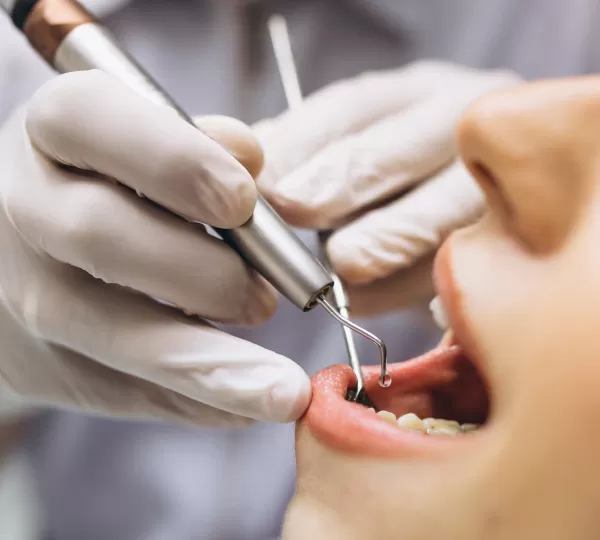Root Canal Treatment in Penang
Root Canal Treatment
Experiencing severe tooth pain or discomfort can be unsettling, but a root canal might be the solution you need. At Chin Lim Dental, we understand that the thought of a root canal can be daunting, so we’re here to make the process as smooth and comfortable as possible. Our team of skilled dentists use advanced techniques to relieve pain and restore your tooth’s health, helping you get back to enjoying life without dental discomfort.
What is a Root Canal Treatment (Endodontics)?
The inner part of your tooth, known as the pulp, is made up of nerves, blood vessels, and connective tissue. When this pulp becomes infected or inflamed from decay, injury, or other issues, it can lead to severe pain and swelling.
If left untreated, the infection can spread to the surrounding bone and tissues. This can lead to severe pain, swelling, abscess formation and eventually, tooth loss if the infection is not addressed. The tooth may also weaken and result in structural failure, making the tooth more likely to break or crumble.
A root canal treatment, also known as an endodontic treatment, addresses this problem by removing the infected pulp, thoroughly cleaning and disinfecting the tooth’s interior, and sealing it to prevent future infections.
When Do I Need a Root Canal?
You may need a root canal if you experience symptoms indicating that the inner pulp of your tooth is infected or damaged. If you’re experiencing any of the following symptoms or have concerns about the health of a tooth, it’s important to consult with your dentist.
Persistent Tooth Pain
Ongoing or severe pain in a tooth, especially if it’s throbbing or sharp, can be a sign of pulp infection.
Sensitivity to Heat or Cold
Prolonged sensitivity to hot or cold temperatures that lingers even after the stimulus is removed might indicate an issue with the tooth’s nerve.
Pain When Chewing or Biting
Discomfort or pain when chewing or biting down can suggest damage or infection in the tooth.
Swelling and Tenderness
Swelling in the gums near the affected tooth or tenderness in the surrounding area can be signs of infection or inflammation.
Tooth Discoloration
A tooth that becomes darkened or discolored compared to surrounding teeth may be experiencing internal damage or infection.
Gum Abscess
The presence of a pimple-like bump on the gums (gum abscess) can indicate an infection in the tooth’s root.
Benefits of Dental Bridges
Preserves Natural Teeth: Root canal treatment allows you to keep your natural tooth, which is crucial for maintaining proper chewing function and bite alignment.
Relieves Pain: The procedure alleviates pain caused by pulp infection or inflammation, helping you return to normal daily activities without discomfort.
Prevents Further Damage: By addressing the infection or damage, endodontic treatment prevents the need for tooth extraction and reduces the risk of more severe oral health issues.
Restores Functionality: After treatment, the tooth can be restored with a crown or filling, enabling you to chew and speak normally.

The Root Canal Surgery
Consultation
Your dentist will begin with an examination, including X-rays, to assess the extent of the damage and determine if a root canal is necessary. They will discuss your symptoms, medical history, and treatment options with you.
Preparation
To ensure your comfort, a local anesthetic will be administered to numb the affected tooth and surrounding area. Your dentist will then place a rubber dam around the tooth to keep it dry and free of saliva during the procedure.
Cleaning and Shaping
The dentist will make a small opening in the top of the tooth to access the pulp chamber and root canals. The damaged or infected pulp is then carefully removed, and the canals are cleaned and shaped to prepare for filling.
Filling and Sealing
Once the canals are thoroughly cleaned and disinfected, they are filled with a biocompatible material called gutta-percha. This material seals the canals to prevent future infections.
The Excellence, Innovation, Trust!
Come with us for a gentle dental experience that’s straightforward, friendly, and focused on your well-being.
Our experienced team is dedicated to provide a safe and friendly experience. With our expertise and commitment to delivering exceptional results, you can trust us to help you achieve a healthy, beautiful smile that lasts a lifetime.
Expertise
Highly skilled dental team with a passion for excellence.
Latest Technology
State-of-the-art equipment ensuring precision and comfort.
Experience
With almost a decade of experience serving our communities.
Comfortable Environment
Modern and serene settings for a relaxed experience
What Our Patients Say
Root Canal Treatment at Chin & Lim Dental Penang
Don’t let tooth pain or damage affect your quality of life. Contact Chin Lim Dental to schedule a consultation and learn more about our endodontic treatment options. Our team is here to help you restore your tooth’s health and function with expert care.

FAQ on Root Canal Treatment
You might need a root canal if you have a tooth that is severely decayed, infected, or injured. Common signs include persistent tooth pain, prolonged sensitivity to hot or cold, swelling, and discoloration of the tooth.
The procedure is generally performed under local anesthesia, so you should not feel pain during the treatment. Some discomfort or mild soreness after the procedure is common but typically subsides within a few days.
The duration of a root canal procedure can vary depending on the complexity of the case and the number of roots involved. Generally, it takes about 60 to 90 minutes. Some cases may require multiple appointments, especially if a tooth has more extensive damage.
After a root canal, you may experience some tenderness in the treated tooth and surrounding area. This is normal and should improve within a few days. It’s important to follow your dentist’s aftercare instructions, which may include avoiding hard or sticky foods and taking prescribed medications.
Maintain good oral hygiene by brushing twice a day, flossing daily, and using an antimicrobial mouthwash. Avoid hard or sticky foods that could damage the tooth. Attend all follow-up appointments to ensure the tooth is healing properly.
In many cases, a tooth that has undergone a root canal will require a crown to restore its strength and function. A crown helps protect the tooth from future damage and ensures it blends seamlessly with your natural teeth.
While root canals have a high success rate, it is possible for the treatment to fail if the infection recurs or if the tooth is not properly sealed. Regular follow-up visits and good oral hygiene are crucial for ensuring the long-term success of the treatment.
With proper care, a tooth that has undergone a root canal can last many years. Regular dental check-ups and good oral hygiene practices contribute to the longevity of the treated tooth.










